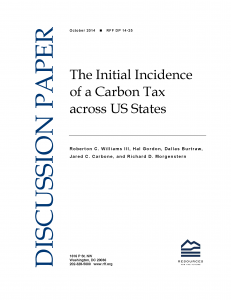Looking at the Effects of a Carbon Tax across States

The use of revenue from a carbon tax or cap-and-trade program substantially affects who gains and who loses as a result of the policy; indeed, it is often more important than the effect of the carbon tax itself. In a previous RFF discussion paper, we (together with RFF’s Dallas Burtraw and Richard Morgenstern, and Jared […]
Belt and Suspenders and More: A Look at the Incremental Impact of Energy Efficiency Subsidies
Lawmakers employ a number of policy instruments to promote energy efficiency, including regulatory mandates, information campaigns, and technology subsidies. For energy-consuming durable goods, consumers often purchase products ultimately eligible for a subsidy because of their design under an energy efficiency standard and marketing subject to government-required information disclosure policies. Appliances such as refrigerators, dishwashers, and clothes […]
Measuring the Early Effects of a Carbon Tax: Comparing Three Policies across Income Groups
Economists argue that the most efficient way to reduce greenhouse gas emissions is to raise the price of energy by introducing a price on carbon emissions, either through a tax or a cap-and-trade regime. A tax (or a cap-and-trade system that auctions off permits) has a secondary effect beyond providing incentives for reducing emissions: it […]
The New CAFE Standards: Are They Enough on Their Own?
The new CAFE standards may require complementary policies to meet the ambitious goals of reducing fuel consumption and greenhouse gas emissions. In a new RFF discussion paper, I examine the new footprint standards, their implications for changes to the size mix of vehicles, and the role of credit policies on compliance and cost-effectiveness of the […]
Resources Magazine: Ensuring Competitiveness under a US Carbon Tax
Tax exemptions, industry rebates, and border tax adjustments can help protect the competitiveness of industries affected by a carbon tax, but they are not equally efficient at achieving economic and environmental goals. In the latest issue of Resources, Richard Morgenstern, Nathan Richardson, and I examine the issues. Read more here.
Policy Options for Addressing Carbon Tax Impacts to Households
Carbon pricing remains the strongest option for reducing greenhouse gas emissions and mitigating climate change. But such a policy still faces serious political hurdles in part because of the perception that a carbon tax would most negatively impact the poor. Clayton Munnings and I address the potential of a carbon tax to actually be progressive […]
Looking for a Sustainable Funding Model for State Parks
Many state park systems are struggling. And in some states, the legislature is making matters worse. It is time to rethink the approach to financing parks and work toward a more sustainable and efficient long-term funding system. The Kansas City Star recently reported that the Kansas state legislature is proposing to rob Peter to pay […]

 Subscribe; to our RSS Feed
Subscribe; to our RSS Feed Tweets by @RFF_org
Tweets by @RFF_org 
Recent Comments